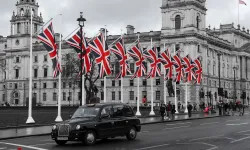UK economy enters recession in second half of 2023 after shrinking 0.30 per cent
The Bank of England remains optimistic about the economy's prospects for 2024, expecting a rebound in growth.

Britain's economy slipped into a recession during the latter half of 2023, contracting by a more significant-than-anticipated 0.3 per cent in the three months leading up to December.
The 0.3 per cent contraction in Britain's economy from October to December came after a 0.1 per cent decline between July and September. This trend went against the expectations of economists surveyed by Reuters, who had anticipated a smaller 0.1 per cent GDP decline for the October-to-December period.
Despite this, the Bank of England remains optimistic about 2024, foreseeing a rebound in growth. However, any slow performance could impact Prime Minister Rishi Sunak's efforts to gain voter support before an expected national election later in the year.
The Office for National Statistics reported a 0.1 per cent decline in economic output for December, contrary to analysts' expectations of a 0.2 per cent decrease.
Following the release of the GDP data, the British pound experienced a moderate weakening against both the dollar and the euro, reflecting market reactions to the economic downturn.
The British economy has slipped into recession for the first time since the initial half of 2020, when it suffered a significant downturn due to the COVID-19 pandemic. This downturn presents a challenge for the ruling Conservative Party, especially with a looming general election and trailing behind the Labour Party in polls.
There's anticipation that Prime Minister Rishi Sunak will set the election date. Amidst these economic woes, hopes are pinned on the Bank of England to initiate interest rate cuts as inflation is currently double the target at 4 per cent.
However, the central bank is exercising caution, wary that reducing interest rates too swiftly could reignite inflationary pressures, despite having previously raised rates aggressively to combat soaring inflation, which peaked at more than 11 per cent in the past year.
(With agency Inputs)